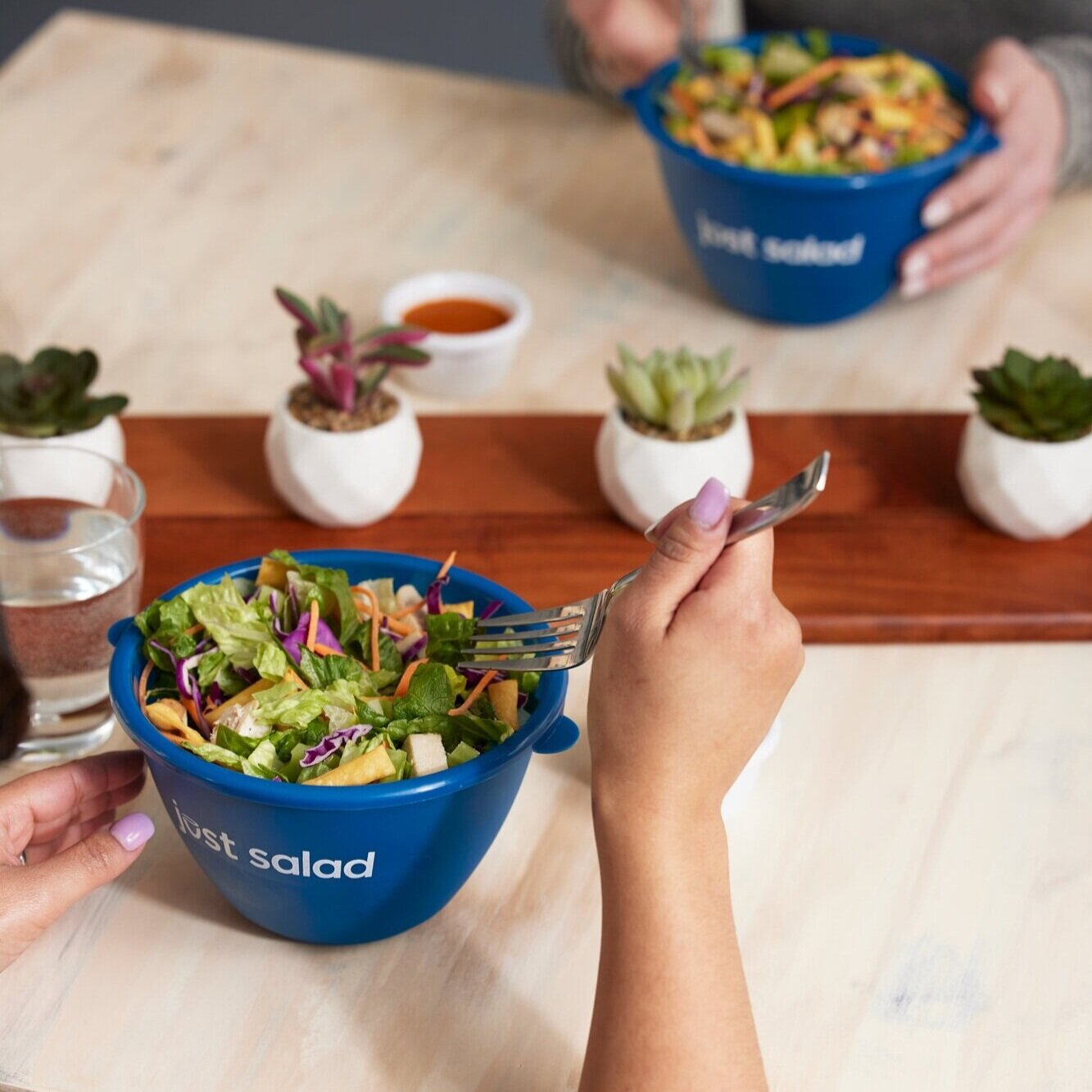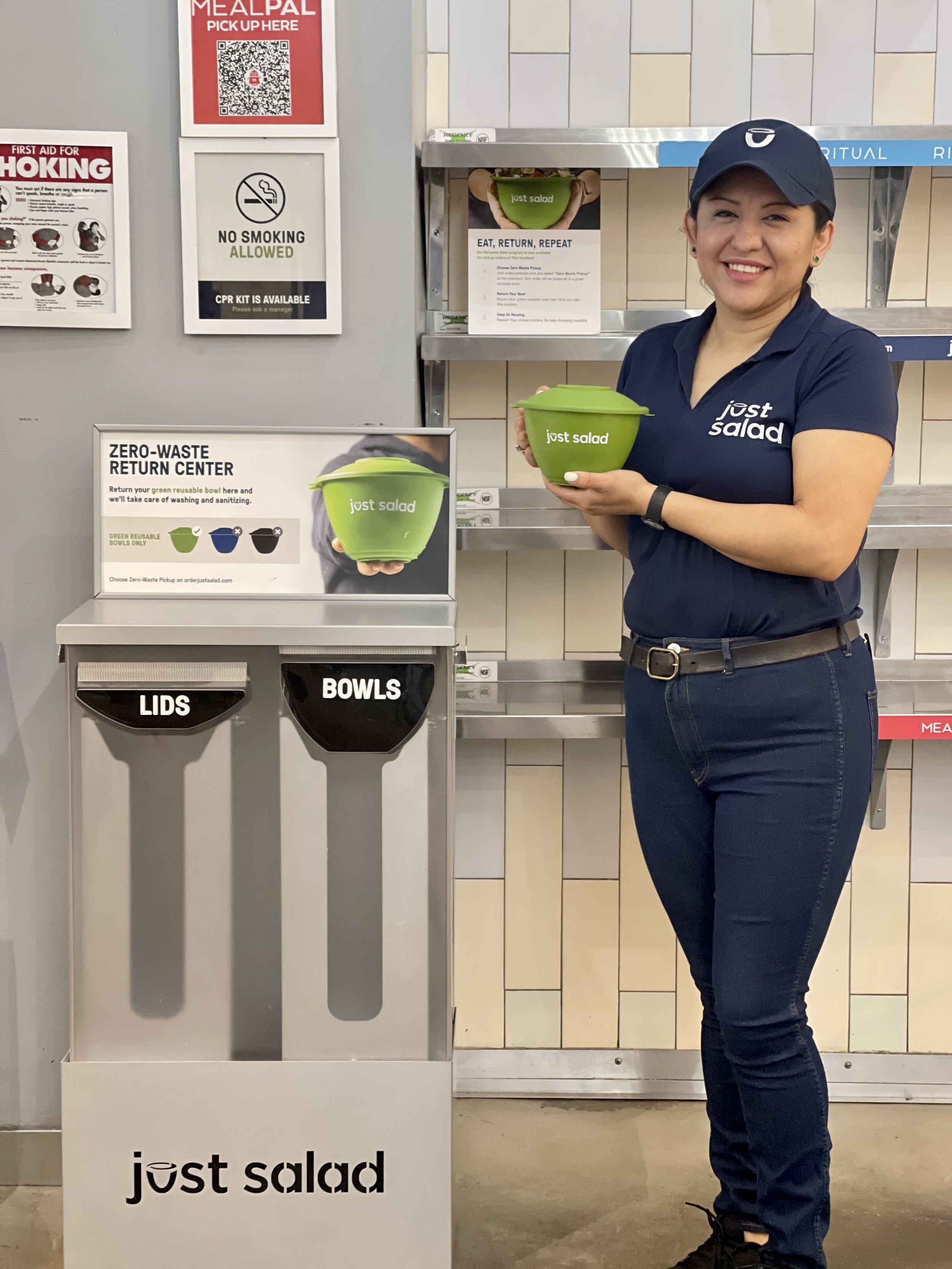A Reuse Success Story: Just Salad and the BringBack Bowl Program
Q&A with Sandra Noonan, Chief Sustainability Officer at Just Salad
Upstream is excited to kick off a new series highlighting reuse success stories across the food service industry. First in line is Just Salad’s BringBack Bowl pilot program.
We interviewed Sandra Noonan, Chief Sustainability Officer at Just Salad, on The Indisposable Podcast and held a Q&A with Sandra to learn more about the thought behind the program.
Let’s dig in.
About Just Salad’s BringBack Bowl Program
Empowering customers to eat with purpose, Just Salad is a fast casual restaurant, home to the world’s largest restaurant reusable program, and the first U.S. restaurant chain to “carbon label” its menu.
Just Salad launched its BringBack Bowl program as a pilot in New York City in January 2021. Customers who order from the pilot stores, located in New York City at 600 3rd Ave and 2056 Broadway (as of June 2021), can participate at orderjustsalad.com.
The BringBack Bowl Order and Return Process
Step 1: At checkout, the customer selects “BringBack Bowl – Pickup” or “BringBack Bowl – Delivery.”
Step 2: The customer receives their pick-up or delivery order in a signature green Just Salad reusable bowl.
Step 3: The customer receives an email receipt which contains return instructions.
Step 4: A reminder email to return the bowl is sent to the customer a few days after the order is placed.
Step 5: The customer drops off their bowls at participating Just Salad locations.
In the future, the BringBack Bowl program will feature a small deposit on the Just Salad reusable bowl, which will be refunded when the customer returns their bowl.
Q&A with Sandra Noonan, Chief Sustainability Officer at Just Salad
Q: Tell us about your journey. What brought you to work for Just Salad and where do you hope to take the company?
A: In 2019, I started a community group called ZeroWasteNYC to connect with other New Yorkers who, like me, were trying to live a zero-waste lifestyle. Just Salad was the only fast-casual restaurant where we could meet and dine waste-free, thanks to the Reusable Bowl program. I became so enamored of the program – and such a regular user of it – that I contacted the company’s CEO directly with some ideas for expanding it. That ultimately led to my working at the company.
Q: Why is sustainability such a big part of your brand, and how are you prioritizing it?
A: The Reusable Bowl has been part of the company’s identity since day one. Our Founder & CEO, Nick Kenner, simply refused to accept single-use as the only option. As CSO, I work with our Operations, Supply Chain, Culinary and Development teams to embed sustainability into everything we do.
This year, our priorities include expanding the Reusable Bowl program; scaling our food waste reduction program, enhancing our Sustainability Champion employee training program; understanding the impact of our carbon labeling program; and creating a longer-term carbon neutrality strategy.
Q: Did carbon-labeling the menu impact customers' orders/choices? Does information like this really lead to behavior change?
“We’ve observed that a larger proportion of our customers are choosing options which have a lower impact on the environment.”
A: In 2020, we estimated the carbon footprint of every item on Just Salad’s menu, based on the emissions of growing and transporting each ingredient. We then added a “Climatarian” section to our menu (at orderjustsalad.com) that features our lowest-emissions items.
We are working with university researchers to understand the behavioral impacts of these labels. Meanwhile, based on sales data, we’ve observed that a larger proportion of our customers are choosing options which have a lower impact on the environment. That’s a positive sign.
Q: Now that Just Salad has two reusable bowl programs, how are incentives used in your programs? Do they increase participation?
A: In our MyBowl program, customers get a free topping every time they come in with the bowl, and that incentive has been critical to the success of the program.
In the BringBack pilot program, there is no incentive for now. We want to understand how people react to the program in the absence of any incentives before we scale it.
Q: One thing you discussed in the Just Salad case story was how important the customer journey is with each 'touchpoint.' Can you elaborate more on that?
A: By touchpoints, we mean the whole end-to-end journey of reuse: Becoming aware of the program, opting in to it, returning your container, and doing it all over again. We want to make every step of the journey as convenient and as possible for the customer.
Q: Why would a chain such as Just Salad opt to internalize a reuse system vs. going through a third party vendor? Are there pros and cons?
A: I don’t know if there were any third parties to work with back in 2006 when our reusable program started! As the reuse movement grows and reuse becomes more mainstream, we’ll evolve the program as needed, with an excellent customer experience remaining our top priority.
“If you embed reuse into your brand, your training program, and your mission, then you’re well on your way.”
Q: Are there any other key takeaways you want to share with other businesses?
A: If you have a strong Operations team like Just Salad has, and if you embed reuse into your brand, your training program, and your mission, then you’re well on your way.
Q: Who would you love to see walk in the door of one of Just Salad’s locations someday and order a salad (in a reusable bowl, of course!) and why?
A: Jimmy Fallon! He mentioned Just Salad on his show recently, and we got a kick out of that. Plus, there’s a Just Salad store very close to his studios in midtown Manhattan.



